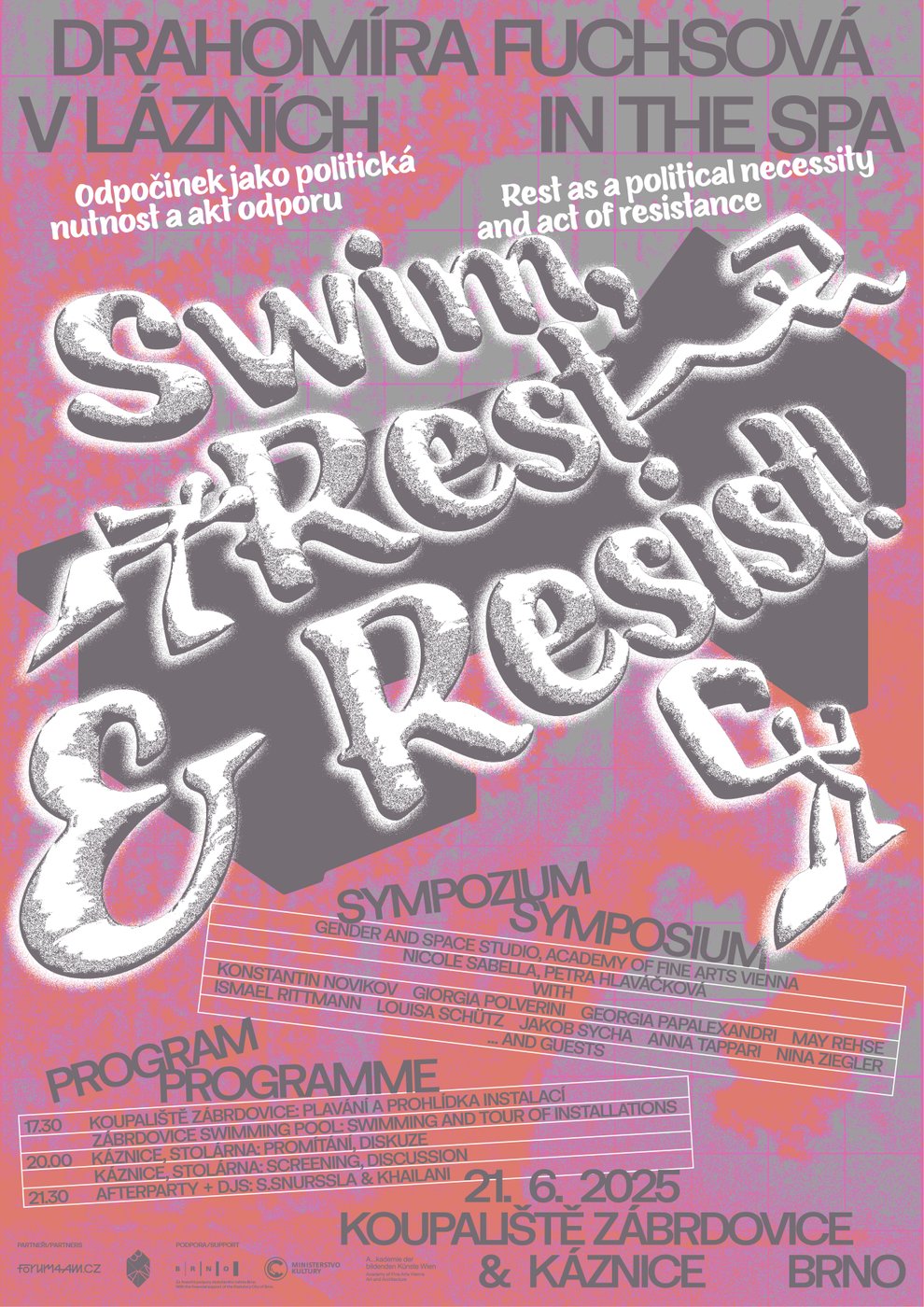Swim, rest & resist!
Gender and Space Studio, IKA, SS25 Finals. Drahomíra Fuchsová in the Spa. Rest as a political necessity and act of resistance.
Program:
21.6., 17:30 – 21:30 h, Brno, CZ
17:30 h Zábrdovice summer bath: swimming and guided tour
20–21 h Káznice (former prison), Bratislavská st.: talks, projection, discussion
21:30 h afterparty - DJ s.snurssla & Khailani
Petra Hlaváčková & Nicole Sabella
with
Konstantin Novikov
Giorgia Polverini
Georgia Papalexandri
May Florine Rehse
Ismael Rittmann
Louisa Schütz
Jakob Sycha
Anna Tappari
Nina Ziegler
… and guests
Partners:
4AM Forum for Architecture and Media (forum4am.cz)
Brno Architecture Manual (bam.brno.cz)
Support:
City of Brno
IKA
Come take a swim at the swimming pool in Zábrdovice and immerse yourself in common talks, projections, artistic interpretations, and findings about the local abandoned winter spa. Let's resist the (un)culture of performance, relax, and find ways of rest accessible to all.
Until the early 1990s, the winter spa was a popular place of accessible recreation and personal hygiene for all. What stories does it hold, and which memories linger? What lies ahead for the building in the current neoliberal climate, when rest has become a business of wellness? And who is enabled to rest in a system that runs on political inequalities created on the basis of discriminating factors such as gender, race, class, ethnicity, age, religion, or disability?
Rest and self-care should be more than an individualized and costly necessity to survive the pace of work under neoliberalism. They should be a political necessity and an act of solidarity and resistance.
Who looked after the household and children of well-known Brno architect Bohuslav Fuchs so that he was free to pursue his career? What are the challenges of caring for architecture and public space, and how do we care (for each other) through architecture? And who is socially enabled to rest? In our project, we will explore the theme of ‘care and architecture’ on several levels.
As reproductive work, it should be a collective and shared responsibility, but in fact, it is mostly women* who are in charge of households and children in the traditional gender order – even if they are artists or architects themselves. Drahomíra Fuchsová, the wife of the functionalist Brno architect Bohuslav Fuchs, was also a designer. Yet, like many others, she remains almost unknown to the general public.
Another level of the project’s interest in ‘care and architecture’ concerns the often ambiguous activity required to preserve valuable architectural heritage. One of Fuchs' most important functionalist Brno buildings, the spa complex in Brno-Zábrdovice, served as a recreation center until the 1980s, pointing to (self-)care as a key activity. Going here to visit the sauna, to have a massage or a relaxation bath was an affordable means of self-care for many among Brno's population during state socialism. However, the building has been abandoned for years and is in a state of neglect. How do we deal sensitively with important buildings that require complete reconstruction and have long since lost their purpose in the context of today`s approaches to adaptive reuse? Care and rest should be social values accessible to everyone and a means of resistance to contemporary pressures for productivity. Yet access to rest is unequally distributed in political systems characterized by white supremacy, capitalism, ableism, patriarchy, classism, racism, homophobia, and other forms of discrimination.
The wider neighborhood of the Zábrdovice spa also raises the theme of gentrification and ghettoization of urban areas and the complex dynamics of unfinished public space. How should this place be addressed in the context of the needs of the local Roma community, which is disproportionately affected by a lack of access to affordable housing due to racism? Revitalizing the city's baths also raises questions of spatial justice and accessibility. Rest and self-care should be more than an individualized and costly requirement for surviving the work rate under neoliberalism. It should be treated as a political necessity and an act of solidarity and resistance.
